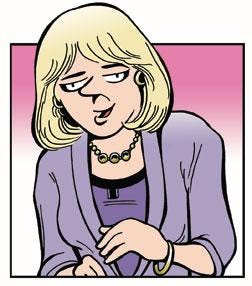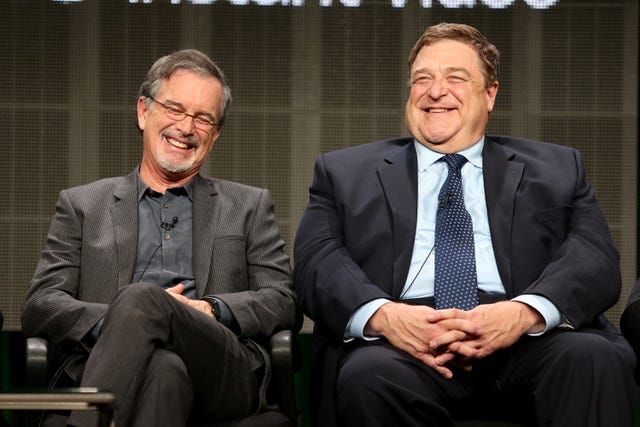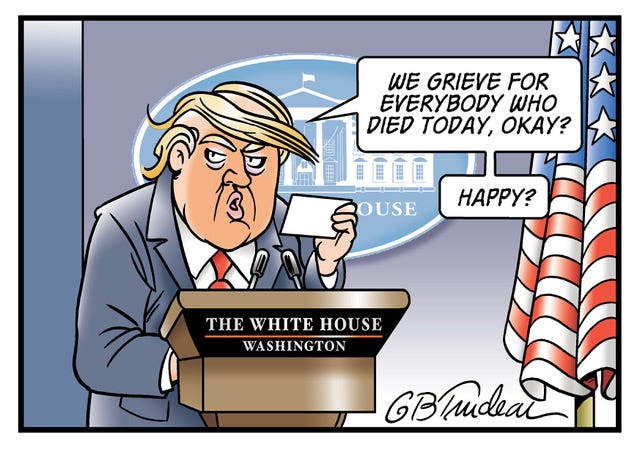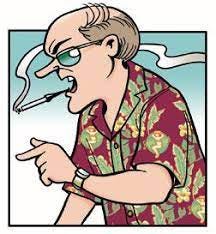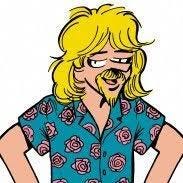Ruminating with GARRY TRUDEAU
In a rare interview, the creator of “Doonesbury” defends baby boomers and picks his favorite characters.
I first spoke to Garry Trudeau, off-the-record, in 1985, when I was Newsweek’s media critic and he was amid one of his periodic controversies, this one over cancellations by a few newspapers of strips where he—accurately— linked Frank Sinatra to organized crime figures. As usual, he loved the flap, and welcomed my story about it. That was the year CNN launched “Larry King Live” and I went on the show defending Garry, who had only spoken to the press once in the 15 years since he started “Doonesbury.” I remember little of that evening except that when the elevator landed in the lobby of the ratty building on Eight Avenue then-occupied by CNN—and the door opened—I found myself inches away from Sinatra. I asked him about the Trudeau strips, of course. He grunted and got on an elevator, presumably to go up and talk—off-camera— to his friend Larry King.
In 1990, on the 20th anniversary of “Doonesbury,” I convinced Garry to break his long silence. With his Pulitzer Prize-winning strip running in more than 1,000 newspapers, he felt it was wrong to play favorites by granting interviews to some newspapers and not others. Talking to Newsweek—and just Newsweek— was a way around that problem. I dogged him (and his wife, Jane Pauley) for weeks, and even sat in Garry’s little West Side studio at 2:00 a.m. watching him write and draw on deadline.
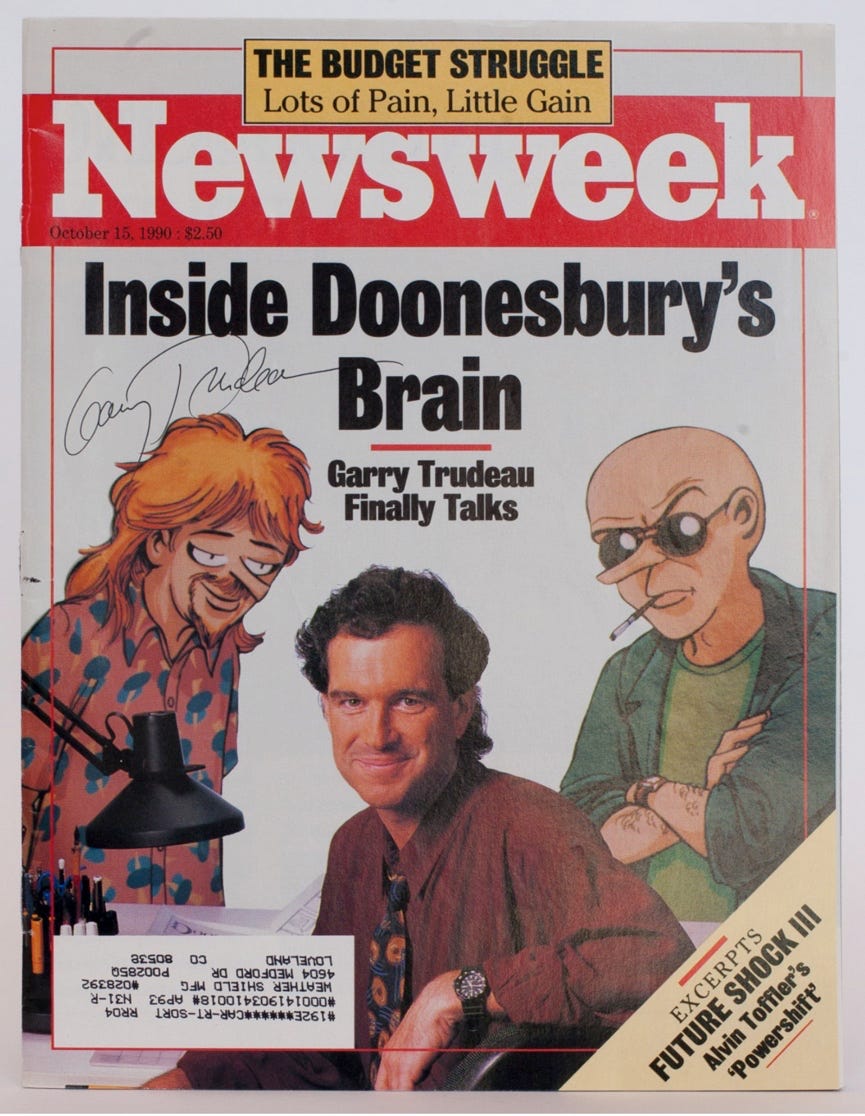
Afterwards, we became friends and began taking quadrennial road trips together to the New Hampshire primary, where we saw a besieged Bill Clinton give his famous “Til the last dog dies” speech in Dover, among other adventures. (In 2008, we followed Obama to Berlin and London). I was writing for Newsweek and, by 1996, yakking on MSNBC; Garry was gathering material for his strip and, it turned out, something else that would lead to a great adventure.
In New Hampshire in 2012, Garry told me had had written a pilot script for a half-hour TV show called “Alpha House,” which featured four Republican senators living in a man-cave on Capitol Hill. I helped him sell it to Amazon and he promoted me to executive producer (along with Elliot Webb). Garry wrote and the three of us produced two seasons (21 episodes) of the show, which starred John Goodman, Clark Johnson, Mark Consuelos and Matt Malloy, with a great supporting cast that included Amy Sedaris, Wanda Sykes, Bob Balaban and Janel Maloney and cameos featuring everyone from Elizabeth Warren and Bill Murray to Tom Brokaw and Grover Norquist. Garry turned out to be a natural show runner and we had consistent fun. Our only regret was that we didn’t get more seasons.
JONATHAN ALTER:
Hi, Garry:
First of all, congratulations on 50 years of Doonesbury syndication. It’s a long way from Bull Tales in the Yale Daily News. So as not to ask you the cliched question: ‘Can you believe it has been 50 years?’, I’ll frame it this way: Can you believe it has been half a century?
GARRY TRUDEAU:
I have more difficulty believing I still have a job. Being the proprietor of an established comic strip is about as close to tenure as pop culture offers, but I never assumed I’d be going the distance. Since breaking onto the comics page is a zero-sum game, I naturally resented legacy strips when I was younger, but I’ve come around. And to make matters worse, I’ve been granted the rare privilege of rerunning old daily strips -- just in case there are any colleagues left who still think life is fair. I work hard on the Sunday pages [where the strips are still new], which I think benefit from the extra time and attention, but I sorely miss the storytelling that you can only really do with dailies.
JON:
We’re both baby boomers and your Sunday strip still chronicles the lives of boomers. But as we both know, millennials think we screwed up badly and left them behind the eight ball (to use a Greatest Generation expression). What’s your take on their indictment?
GARRY TRUDEAU:
Certainly their government has broadly failed them, but I’ve always thought it a mistake to try to understand political history as if only one discrete generation were in harness at a time. And generations, especially ours, hardly speak with one voice. The same college that helped shape me and Oliver Stone, say, also spit out Dick Cheney and John Bolton. The drift toward income inequality, deregulation and a hollowed-out middle class began long before boomers were in any position to do anything about it. Gen X and millennials have been in the voter pool for some years now, so it may be time to stop pinning responsibility for our national decline on any one age group.
“…I’ve always thought it a mistake to try to understand political history as if only one discrete generation were in harness at a time…The same college that helped shape me and Oliver Stone, say, also spit out Dick Cheney and John Bolton.”
JON:
Agreed. But wasn’t there something especially self-absorbed about our generation? Boomers only marched against the Vietnam War when the draft existed. At the same time, we deserve a lot of credit for the women’s movement, which you chronicle with Joanie Caucus and others, and for better parenting. How much generational subtext--either conscious or unconscious--is there in the strip?
GARRY TRUDEAU:
All generations look after their own interests. Sometimes those interests are widely shared, as during WW II. The problem with the boomer generation is that they were so theatrically (and sanctimoniously) noisy in advocating for a more equitable society, that when they fell short, the “hypocrisy” was thrown into high relief. I would argue that subsequent generations have been just as aspirational and activist (see BLM and Parkland kids), but they’ve lowered expectations and gotten more real. Try asking a 20-year-old what “selling out” means. They just want jobs.
As to feminism, boomers were not the thought leaders who created the movement; they were foot soldiers. Freidan, Greer, Steinem et al were not boomers. Joanie Caucus was ten years older than the communards whose views on gender she impacted. Boomers can certainly be credited with a full embrace of women’s rights, but our elders got the ball rolling.
“The problem with the boomer generation is that they were so theatrically (and sanctimoniously) noisy in advocating for a more equitable society, that when they fell short, the ‘hypocrisy’ was thrown into high relief.”
Lastly, are we really better parents for having been so hands-on? There’s an argument that we produced far less sturdy and resilient children than our parents did. The mental health facilities at universities today dwarf any that we would recognize.
JON:
Which of your characters’ story lines do you miss the most? Can you tell us if/how you would wrap up a few of those lines if you could?
GARRY TRUDEAU:
If you’ll indulge me, the first to leap to mind is actually moot, since I’ve already killed off both characters! Lacey and Dick Davenport’s stories always came easily to me, because I spent an early part of my life in their genteel, WASPy world. I knew those people, and although I never overlooked their cluelessness, I tried to celebrate their abiding decency, which I miss. But the characters who are restless and kicking around in my mind, who want to move on and who need new story arcs, are Alex, Leo and their kids. I can’t tell you where I’d take them, because as you know all too well, Jon, I never do work I don’t have to. Give me a deadline and I’ll come up with something.
JON:
That’s not quite true--you write spec scripts in your seventies. That’s not something you have to do. Do you miss Alpha House?
GARRY TRUDEAU:
There’s a difference -- the daily strips are over. Mapping out story arcs for Doonesbury would be a waste of time. Not that writing spec scripts is anything less than a crap shoot, but I have one cardinal rule: The subject matter has to interest me, deeply. As long as I know I’ll enjoy the journey -- the research, the interviews, creating believable characters and a compelling story -- I can’t lose. My livelihood doesn’t depend on it, so I’m okay when someone doesn’t want to give me $30M to stand up a new series. Not happy about it, of course, but I’ve already done three shows. Who says I’m entitled to another?
“As long as I know I’ll enjoy the journey -- the research, the interviews, creating believable characters and a compelling story -- I can’t lose.”
As to Alpha House, I certainly miss the people. And I do think not having a season in the Time of Trump was a missed opportunity. But other than that, no. I’m ready to do something new.
JON:
I watched a couple of Alpha House episodes recently and they hold up really well as pieces of entertainment--an assessment our small cult following would confirm. At the same time, I was shocked (but not surprised) by how different the show looks after being sprayed by Agent Orange. The composition of today’s Senate isn’t actually that much different--there are still some reasonable Republicans like those living in the townhouse, and Democrats are back in control, as they were in our show. But the climate is so different. Pre-Trump and post-Trump (and we’re not at the latter yet, of course) is like pre-war and post-war.
GARRY TRUDEAU:
We had one character, Senator Andy Guzman [played by Mark Consuelas], who was already comfortable with the Tea Party, and he would’ve had no trouble making the adjustment to accommodate MAGA. Of the other three, John Goodman’s character -- Gil John Biggs -- would have had the most trouble stomaching Trumpism, and I think he would have gone down in flames in his next election. I actually blocked out 2016 for a third season, but Amazon pulled out at the last minute.
JON:
I remember well. In late 2015, you and I and Will Graham and Jack Hitt went back into the writers room and had great time working on four more episodes, including one where Hillary Clinton tries to talk Gil-John out of running in 2016 as a third party candidate. You then teed the whole thing up.
BTW, is it true that our show was the first-ever to use drones (Season Two, Episode Three)?
GARRY TRUDEAU:
With the sheer volume of programming at the time, that seems improbable. Other shows were starting to use drones for aerial shots, but it’s possible we were among the first to use them as a plot device. Let’s just say we were early adopters.
JON:
You once told me that you never write jokes. That’s a confusing point for people. How do you distinguish between a funny line and a joke?
GARRY TRUDEAU:
There are many kinds of jokes, but most tend to be structured and mechanical. There’s a set-up, a build-up of expectations, and then a switchback that defeats them -- a surprise that triggers a laugh. A good joke is actually very unnatural. You rarely hear them in real life. Years ago, when I was working on the Broadway musical [of Doonesbury], one of the understudies fed me a funny line for B.D., and I dropped it into the show. It worked, but I realized it would have worked coming out of the mouths of any one of the other characters. A joke is a discrete thing -- a little bit of content you can package -- like the gags the New Yorker once bought to pair with generic cartoons.
“I do character humor. I find the funny in people just being themselves. That’s where the gold is for me. “
For better or worse, I can’t write that kind of comedy. I do character humor. I find the funny in people just being themselves. That’s where the gold is for me. My “punchlines” are too dry to be recognizable as such. They’re usually tossed off -- or tossed away -- as they would be in normal conversation, something I learned watching Altman movies. And to muffle any rim shot, more often than not, I’ll add a coda -- some continuation that signals we’re only dipping into a running conversation, as opposed to a self-contained one-off.
Don’t get me wrong -- I enjoy traditional jokes, and admire the craftsmanship and economy involved. My all-time favorite is only eight words long: “My best friend is black… in this story.” That’s from a Sarah Silverman routine -- hilarious and ballsy at the same time.
JON:
You were far ahead on Trump--putting him in strips 30 years before he ran for president. How did you know he would be “Yuge!”?
GARRY TRUDEAU:
He told us. Not that I believed it’d come to anything, but he was taking out political ads as early as 1987. I lived in New York, and he was unavoidable — like some ginormous Macy’s Parade balloon, only without the tethers. Ignoring him would not only have been impossible, it would’ve been comedy malpractice. A massive, self-owning asshole as fully realized as Trump only comes along once in a generation.
JON:
How is writing Trump-related strips different from chronicling other presidents?
GARRY TRUDEAU:
Well, it turned out to be way more consuming. But that’s owing more to a bend in my career path than his presidency. A few years earlier, I had stepped away from doing the daily strip to work on Alpha House, in effect suspending all the storylines. I was trying to find my way forward with just the Sunday panels when Trump made his run. He quickly dominated the public conversation, and his toxic rhetoric began to infect every corner of American life. That’s when I decided to reimagine the strip as Doonesbury in the Time of Trump. When it wasn’t about Trump per se, it was about Trumpism and its myriad harms to society and democracy. So for the first time, the strip has become predominantly a political project.
JON:
Is he almost beyond satire?
GARRY TRUDEAU:
No. People say this, but then how do you explain the golden age of comedy that grew up around his presidency? Late-night comedy in particular killed. Satire is sometimes misunderstood as only working through exaggeration, but there are a million ways to undercut grandiosity — a wicked or dry juxtaposition will do the trick. A favorite example: Once when his daughter headed abroad for a conference, Trump tweeted out that “The United States cannot have a better, or smarter, person representing our country than Ivanka.”
To which someone replied: “Why not?’
A massive, self-owning asshole as fully realized as Trump only comes along once in a generation.
JON:
Has Trump put your Nixon and Bush work in a different light?
I find myself struggling to connect to what I disliked about them. It’s not that I can’t remember their crimes and abuses of power--but the sting is gone, and not just because they are no longer in office. It’s like a midcentury American or Brit trying to recall what was so bad about Kaiser Wilhelm.
GARRY TRUDEAU:
Trump plus time, for sure. Contrasts will do that, in both life and art. Duke was for years the most reprehensible character in the strip, but once I paired him up with exiled dictator Trff, he became the (relatively) sane one. And when Zonker acquired his nephew Zipper as a sidekick, he started to present as grounded and sensible, not exactly the Zonker I began with.
JON:
I’ve got a few columns I’d like to have back. Any strips you regret?
GARRY TRUDEAU:
Yes, but not for the reasons I think you mean. I’d like to rewrite the first five years, and edit the second five. They’re all pretty raw. I had little preparation, was hired on the strength of a half-dozen strips, and had to learn my craft in full public view. There are also a few strips I drew in college that are appalling in hindsight, but which a late ’60 all-male audience thought hilarious. You could call them my #MeToo strips, and they’re still out there a half-century after they were published. Thank you, Internet.
JON:
You’ve been uncannily accurate and ahead of the news in several cases. Which one strikes you the most?
GARRY TRUDEAU:
I’m not sure I deserve much credit for prescience. If you write a topical strip day in and day out, sooner or later, you’re going to get lucky. When I’m gaming out what might work ten days in the future — or five weeks with the Sundays — mostly I’m trying to protect the feature from feeling dated, not land on something I’ve predicted.
JON:
OK, Sophie’s Choice time. You only have room in the life boat for five of your characters. Which ones get to live?
GARRY TRUDEAU:
I get five? Sophie only got one! Do they have to get along, or just be my favorites? If the latter, I’ll go with Zonker, Joanie and Duke in recognition of their foundational, tent pole status, then add Alex and Leo, so I have young(er) characters with which to rebuild after we’re rescued.
JON:
With the demise of newspapers, what is the future of comic strips?
GARRY TRUDEAU:
It’s pretty bleak, I think. I keep looking for the online alternative, but as far as I can tell, almost no one’s figured out how to make a living at it. There are a handful of strips that have done reasonably well with merch, but there doesn’t seem to be any workable model for monetizing the comics themselves, especially since a whole generation has grown up without the daily habit of reading them. I certainly no longer encourage anyone to go into the field — for a talented cartoonist today, graphic novels or animation offer far better prospects.
JON:
Would the world be better off if social media had never been invented?
GARRY TRUDEAU:
Yes. For about five minutes, Facebook seemed like a good way to stay in touch with Aunt Mabel in Seattle or reconnect with an old college roommate. It’s been downhill ever since.
JON:
You’ve been involved in scores of controversies over the years--from Mark calling John Mitchell “GUILTY! GUILTY, GUILTY, GUILTY!!” (Notice how I took care to get the punctuation right) to George W. Bush dubbing Karl Rove “Turd Blossom” (Like so much in the strip, true). A few newspapers cancelled strips. But today, someone might cancel you, right? In the past, it was usually the right that lacked a sense of humor. Isn’t that now a big problem on the left, too?
GARRY TRUDEAU:
I would question your premise. I’m not sure I remember a time when some part of the left wasn’t either strident or sanctimonious. It’s why I created “Megaphone Mark” Slackmeyer. I was bewildered by our campus radicals, even while I sympathized with their goals.
Haven’t we been here before? Political correctness has been called out since the late ‘80s. Being cancelled is just a rebranding of shaming, which as a satirist, I’m not exactly in a strong position to condemn. It’s true that the internet can amplify its severity — the punishment doesn’t always fit the crime. And if you throw in doxxing, it can be a nightmare. My point is that society has always found a means to censure transgressive behavior. The norms by which it is judged may change, but cancelling, like gossip and, yes, cartooning, is just another form of social control — how groups preserve (or police) their values. Of course, some cancelling is motivated by nothing more than pure malice, which circles back to both Trump and your question about whether we’d be better off without social media. Both are good reasons to answer in the affirmative.
JON:
You had a Sunday strip recently where Mike is with his grandchildren, who are arguing over whether a nook is bigger than a cranny. Is that one from your and Jane’s own experience?
GARRY TRUDEAU:
No. That came from my staring at the package while waiting for an English muffin to toast. Why did Thomas’s feel it needed to describe its product as having both nooks and crannies? Just a Larry David moment. These are the big questions I think about.
But the strip’s a very good example of my non-joke approach, of how to mine humor from chaos. There are four different perspectives bumping up against one another in the final panel -- we see a toddler’s lack of self-awareness, her brother’s earnestness and credibility, Mike’s joy at being back in the middle of family life, and Alex’s simmering exasperation. No big laugh there, but hopefully a smile of recognition.
JON:
I smiled and laughed a little, too. Thanks, Garry.






